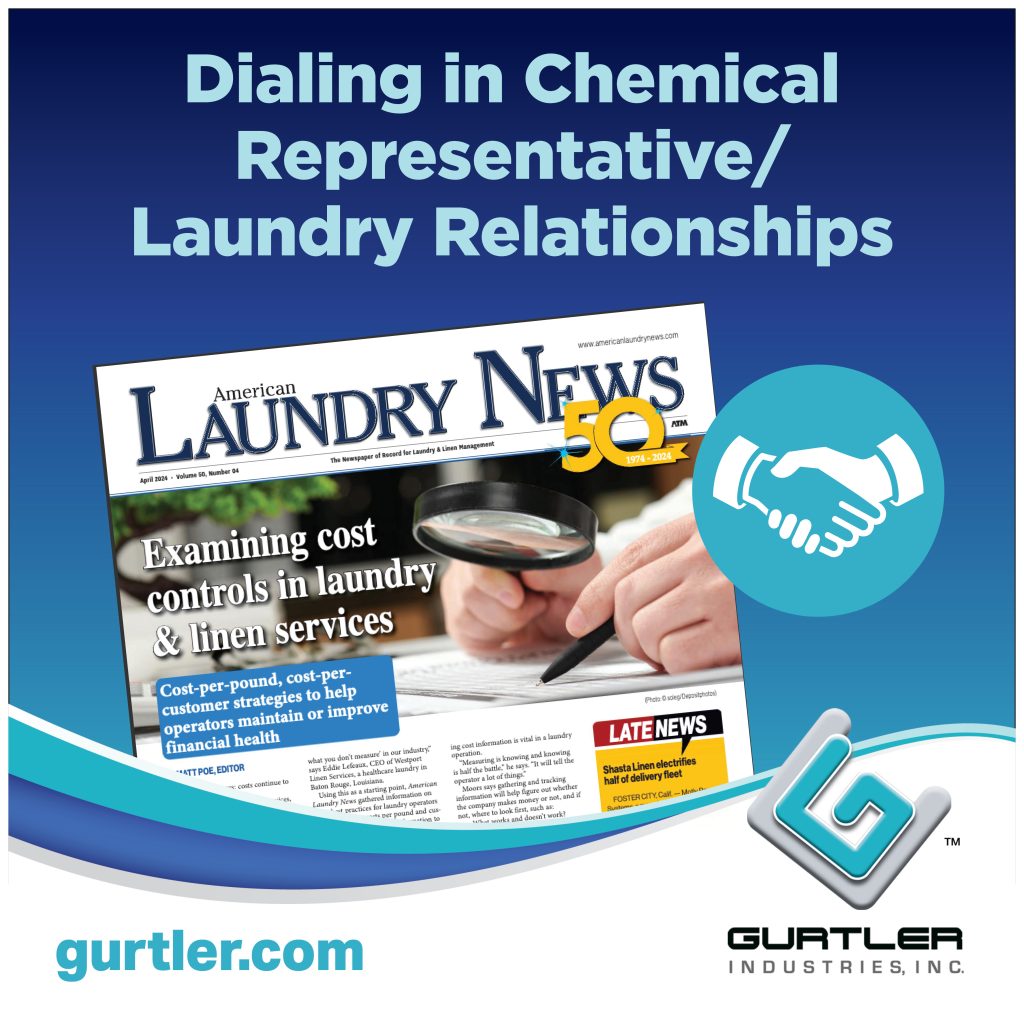April 25th, 2024

By Matt Poe, Editor, American Laundry News The April 2024 edition of American Laundry News features the article “Dialing in Chemical Representative/Laundry Relationships” by Matt Poe, Editor. The article focuses on the key factor of the successful processing of goods is relationships, and one of the most important relationships is that of the chemical representative and the laundry operator.
American Laundry News reached out to operators and chemical suppliers and communicated with five professionals on this subject. Steve Tinker, senior vice president of research and development, marketing, for Gurtler Industries Inc. was one of the contributors. Below is Steve’s response to ALN.
Q: In general, how involved should a chemical representative be in a washroom operation?
A: Good wash formula design, taking into account time, temperature, mechanical action, and chemical action requires a broad understanding of the entire laundry operation. For example, wash formulas that are focused on reducing chemical cost could be designed to make up for the lower chemical action by increasing both time and temperature. However, that could cause an unwanted increase in energy usage and a decrease in production, or pounds of clean laundry produced per hour. So, understanding all the factors that can affect the overall operation is the key responsibility of a well-qualified chemical representative.
Good chemical reps can act as a consultant that reviews your overall operation, from soil-sort to washing to final finishing, to make sure that the process is running smoothly at maximum efficiency, producing the highest possible quality at the lowest possible overall cost.
Q: How often should a rep contact and visit the laundry? Why?
A: Generally, once per month visit is recommended. And the length of a service visit can vary from 4-8 hours, however for very large operations that service call could be completed over a couple of days.
But don’t consider the time factor of a service call as a measure of the quality of a service call. Thoroughly trained, experienced chemical reps can delve into problem solving quickly and effectively, proposing a plan of action to resolve issues.
Another thought: Well-designed and engineered chemical dispensing systems with proven service life and robust performance is a key. If your rep is spending too much time testing, calibrating, and/or repairing their chemical dispensing system they may not be paying attention to the laundering operation and process to identify potential concerns, quality issues, or formulations that out of balance.
Q: Who should the rep be working with at the laundry? Why?
A: Gurtler Industries recommends that our representatives meet with the owner or general manager at the beginning of the service call to review any recent concerns that may have developed since the last service visit, and at the end of the service call to review all the actions and recommendations that we included in our service report. During the service call the rep should interact with line management or leads in each department, (such as soil sort, washroom, finishing department, maintenance, etc.) to make sure that any issues are reviewed.
Q: Should the rep be advising on formulas? Equipment? Washroom practices? Other segments of the wash aisle? Why or why not?
A: For certain the chemical rep should advise and/or develop wash formulas, however this should be a cooperative relationship with management, to make sure that the overall goals of the management team are well understood. Laundry chemical cost can be only a few percent of the overall operational costs of a laundry, however mis-applied chemicals or poorly designed wash formulas can affect the other 95+ percent of operational costs, perhaps driving water and sewer costs out of line, using too much natural gas due to unbalanced hot water use, or increased wash formula times will drive down wash aisle productivity.
Your chemical rep should be inspecting the wash equipment looking for issues, such as leaking drain valves that can cause both a quality issue and an increase in water and energy costs. He or she should also make sure the soil sort operation is designed appropriately. A new textile or garment or customer may call for a new soil sort classification and a new wash formula to maximize processing efficacy.
Q: How can a laundry operator and the rep create a solid working relationship?
A: Communication is the key. Helping the line management make sure that their goals are met, while also communicating with upper management. Previewing the goals of the service call with management and following up with action steps keeps the information flowing from month to month. I recommend developing an approach that has long-term goals. For example, perhaps management is concerned that there is too much overtime labor costs. The chemical rep can suggest changes to the operation designed to reduce labor costs, such as designing wash formulas that are 10% shorter in time, allowing for a higher throughput in the wash aisle. The chemical rep can establish goals, test new wash formulas or new chemistry and measure quality and time savings, and report the findings to management, over the course of a few months.
Q: What are some signs a rep is getting too involved? Not involved enough? How can these be addressed before the relationship is strained to the breaking point?
A: A chemical rep should only be as involved as upper management wants. Again, good, two-way communication is the key. An annual review of the service goals and results is a good way to make sure that the service provided by the chemical rep matches the expectations of the management team.
Q: Please share anything else you consider important in the chemical rep/laundry relationship.
A: A good rep will communicate new chemistry, technology, systems, and industry trends to their customers as they are developed, making sure that the customer understands the potential benefits.
Read the full story on American Landry News website:
(Excerpted from American Laundry News, Volume 50, Number 07, April 2024)

